Bernard Buffet
New York
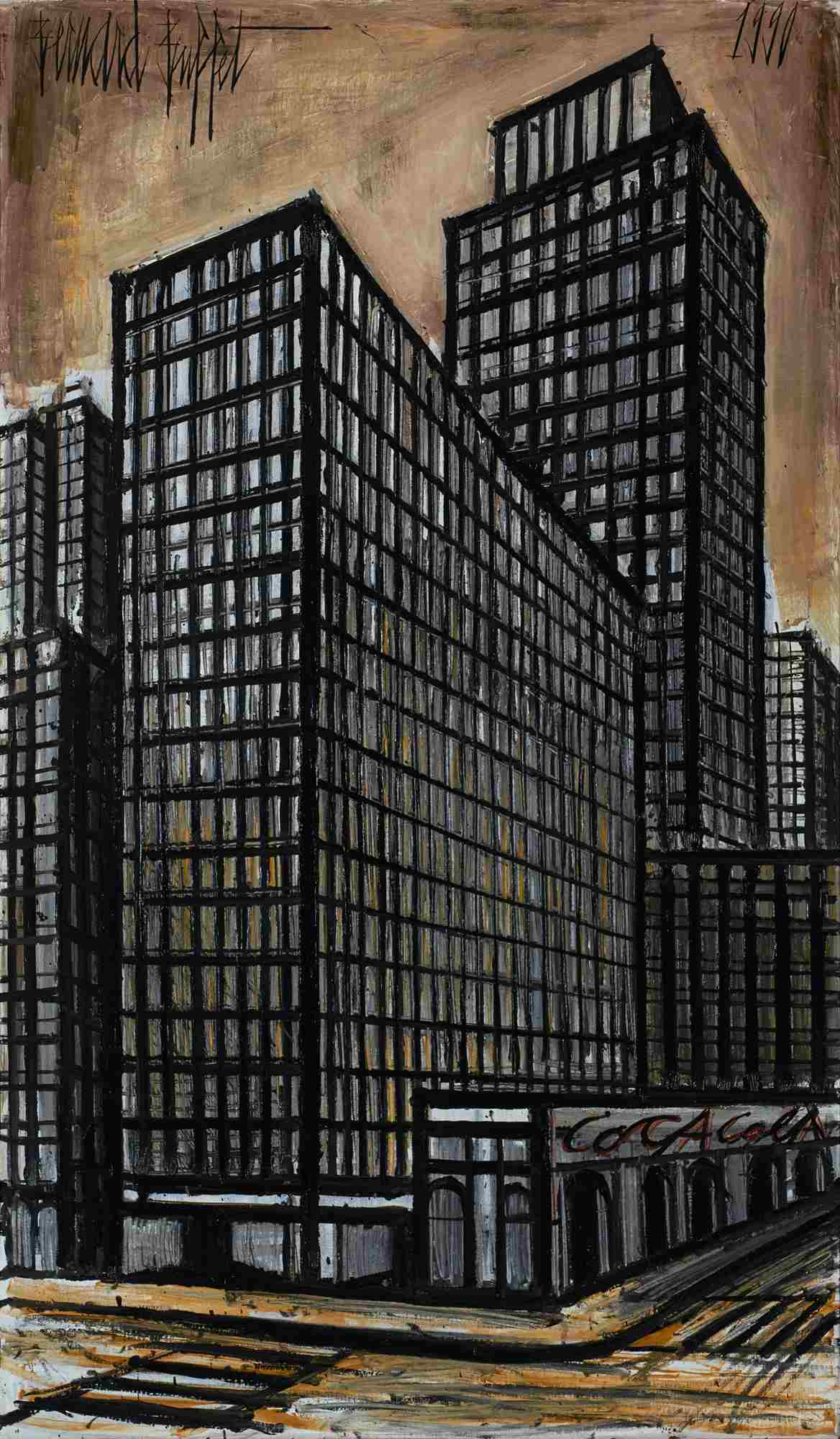
BERNARD BUFFET
New York, Daily News building, 1990
Oil on canvas
195 x 114 cm / 76.8 x 44.9 in.
The painter Bernard Buffet is among the most important post-war figurative painters. A precocious genius, he painted continually all his life. His colossal body of work embraces all the great themes in art.
Buffet is famous for his architectural subjects, among others. Whether Paris, Venice or New York, the artist recomposed memories of urban landscapes to create modern vedute. The painting New York, Daily News building, now on view at the gallery, is a perfect example.
Architectural painting
Architectural painting is a genre in art that concentrates on the depiction of a building, a view of its interior or façade. This subject was developed during the Renaissance and drew attention to perspective effects. It can include an existing building or a Utopia, such as the famous Cité Idéale (Ideal City), a marvel of geometric harmony.
This painting has points in common with Bernard Buffet’s architecture paintings: a composition created from the artist’s imagination, the absence of figures and presence of strong geometric forms.

ANONYMOUS
La Cité idéale, c. 1480
Tempera on wood, 68 x 239 cm
Galleria Nazionale delle Marche, Urbino
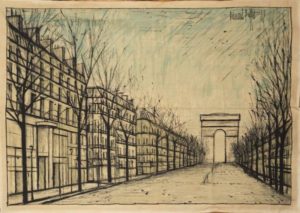
BERNARD BUFFET
Les Champs-Élysées, 1957
Silkscreen print, 120 x 166 cm
From 18th century Veduta to 20th century hyperrealist painting
Vedute became very popular in the 18th century. These are painted or engraved views of cities that could be kept as souvenirs, sort of postcards of their age. Tourism was developing at the time which explains the increasing interest in these picturesque urban views. When the painter Bernard Buffet painted Venice, he set down on canvas or paper the memory of the city he had visited. Buffet, like vedute painters, created views of architecture that are between a realistic view and idealisation.

CANALETTO
Venise : Santa Maria della Salute, 1740
Oil on canvas, 48 x 79 cm
Metropolitan Museum of Art, New York
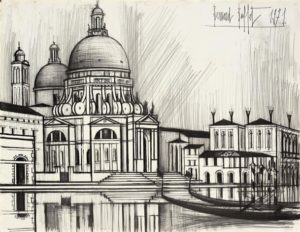
BERNARD BUFFET
La Salute à Venise, 1971
Lithograph, 50 x 64 cm
In the 20th century, despite the upheaval caused by the arrival of photography among the arts, some artists, fascinated by the modernity of buildings, continued to depict architecture. For others, such as the Hyperrealist American painters of the 1970s, these were a chance to show off their skill.
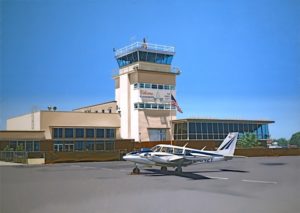
RALPH GOINGS
Sacramento Airport, 1970
Oil on canvas, 149 x 210 cm
Crocker Art Museum, Sacramento
Artists’ fascination for New York
Many 20th century artists were fascinated by the city of New York. Early in the century, this city had attracted Dada and Surrealist artists. The 1913 Armory Show, a major group exhibition of modern art, was a landmark in the history of this American metropolis. The event attracted the French artists who exhibited there, such as Marcel Duchamp and Francis Picabia.
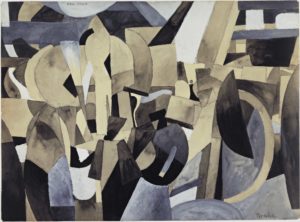
FRANCIS PICABIA
New York, 1913
Mixed media on paper, 56 x 76 cm
MoMA, New York
After the Second World War, New York gradually took over from Paris as the international art capital. New artistic movements developed there, such as Abstract Expressionism. A cosmopolitan city, it attracts artists from all over the world.
The layout of the city’s streets on a grid inspired the artist Piet Mondrian. The way the Dutch painter structured his painting recalls Bernard Buffet’s geometric depiction of the windows of the Daily News building.
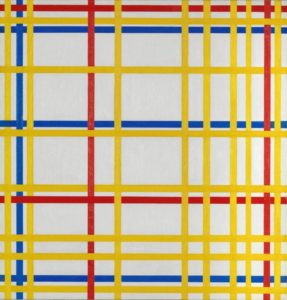
PIET MONDRIAN
New York City, 1942
Oil on canvas
120 x 115 cm
Centre Georges Pompidou, Paris
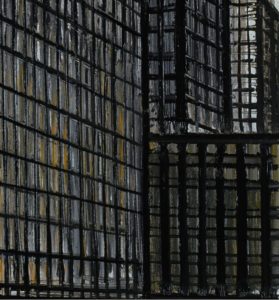
BERNARD BUFFET
New York, Daily News building, (detail), 1990
Oil on canvas
195 x 114 cm
Although New York quickly became the symbol of modernity and of the American dream, artists also emphasized its contrasts.
This is the case for Charlie Chaplin for example, in his film A King in New York. New York social irony is also highlighted in Henri Cartier-Bresson’s photograph Downtown, New York. It shows a man sitting on a footpath, his back curved. The buildings around him seem to be disproportionate, immense and threatening. The verticality of this composition can be compared to that of the artist Bernard Buffet’s New York, Daily News building, presented here.
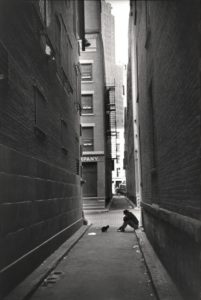
HENRI CARTIER-BRESSON
Downtown, New-York, 1947
© DR
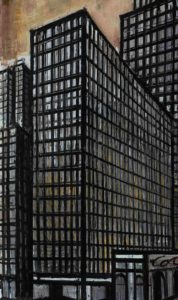
BERNARD BUFFET
New York, Daily News
building, (detail), 1990
Oil on canvas, 195 x 114 cm
Bernard Buffet & Edward Hopper: Silent urban landscapes
Probably one of the most emblematic painters of New York is Edward Hopper. His captivating work can be compared to the painter Bernard Buffet’s art.
In fact these two artists are famous for their depictions of urban landscapes. Although their artistic vocabularies are very different, they are both painters of solitude and melancholy.
Unlike Buffet, Hopper very often included people in his views of New York. His figures do not show any emotion, they are the anonymous inhabitants of cities. For Buffet as for Hopper, urban landscapes are silent environments.
“If you could say it with words, there would be no reason to paint it” Edward Hopper

EDWARD HOPPER
Nighthawks, 1942
Oil on canvas, 84 x 152 cm
Art Institute of Chicago
Painting skyscrapers
New York’s first skyscrapers were built at the end of the 1920s and immediately became popular subjects for artists.
The construction process of these metal and glass giants also fascinated artists and photographers. An example is Charles Clyde Ebbets, who became known for his photographs of the construction of the Rockefeller Center in 1932.

GEORGIA O’KEEFFE
Radiator Building—Night, New York, 1927
Oil on canvas, 122 x 76 cm
Crystal Bridges Museum of American Art, Bentonville
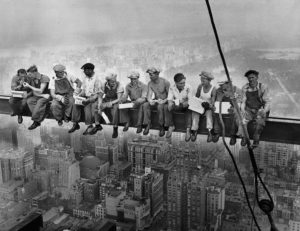
CHARLES CLYDE EBBETS
Lunch atop a Skyscraper, 1932
Collection Bettmann, New York
© DR
The Daily News building shown in Bernard Buffet’s work is related to the wave of construction of the 1920s.
This 145 metres ( 475.7 feet) tall skyscraper went up in New York between 1929 and 1930. In the Art Deco style, it was erected to house the headquarters of the Daily News newspaper and was designated a National Historic Landmark in 1989.
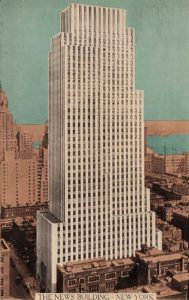
Postcard showing the Daily
News building, 1941
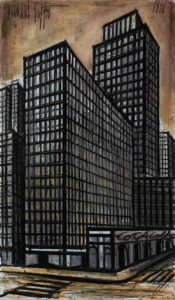
BERNARD BUFFET
New York, Daily News
building, 1990
Oil on canvas
195 x 114 cm
The artist painter Bernard Buffet had an excellent visual memory and kept souvenirs of cities he visited. He also used his large collection of postcards to build his urban compositions. Even though Buffet painted existing cities and monuments, he worked in his studio and not in situ, recomposing his views, changing scales and perspective.
Here, he has used his great skill in drawing to emphasize the monumental appearance of the skyscraper. The geometric shape of the windows is emphasized, creating a grid that gives rhythm to the composition.
The architecture is the true subject of the painting: the streets are empty and no details can be seen through the windows. To emphasize the building, the painter has chosen to place it against a neutral background. This brown sky creates a universal view, neither day nor night.
A halo of light simply encircles the skyscraper to separate it from the background. A whole range of artistic tools are thus used to emphasize the motif’s monumentality.
A gesture to Pop Art
In New York, Daily News Building, an interesting detail is visible: lettering on one of the buildings. This phrase, “Coca-Cola”, is a gesture towards American popular culture, following on from artists of the Pop Art movement. Like these New York artists, Buffet wanted to remove the distinction between high art and popular culture, and to encourage the viewer to look at familiar objects in a new way.
One of the most famous American Pop Art artists, Andy Warhol shared certain convictions with Bernard Buffet. The two artists for example used contrasts between the trivial and the luxurious: with them any ordinary object could be the subject of a work of art. The two artists were hoarders and consumers. They are perfect representatives of our modern society that “is balanced on consumption and its denunciation” (Jean Baudrillard).
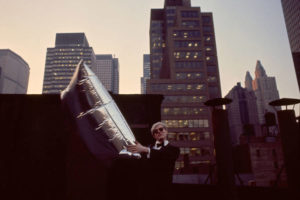
Andy Warhol in New York, 1967
© Hervé Gloaguen / DR
This explains why Andy Warhol was an admirer of the painter Bernard Buffet. He confirmed this in an interview with the art critic Benjamin Buchloh:
“But the French do really have one good painter, I mean, my favourite artist would be the last big artist in Paris. What’s his name? (…) yes, the last famous painter. Buffet. I don’t see any difference between that and Giacometti. Somewhere along the line, people decided that it was commercial or whatever it was. (…) His work is good; his technique is really good; he’s as good as the other French guy who died just a couple of days ago, Dubuffet.”
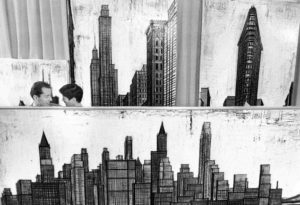
Bernard and Annabel Buffet at the Galerie Maurice Garnier during the exhibition of the series New York, Paris, 1959. © Luc Fournol

BERNARD BUFFET
New York, Daily News building, 1990
Oil on canvas
195 x 114 cm
With New York, Daily News Building le peintre Bernard Buffet has given us a veduta of modern times.
The virtuoso painter has transformed the urban landscape to magnify this silent colossus of metal and glass.
Mathilde Gubanski
© Mathilde Gubanski / Diane de Polignac Gallery, 2020
